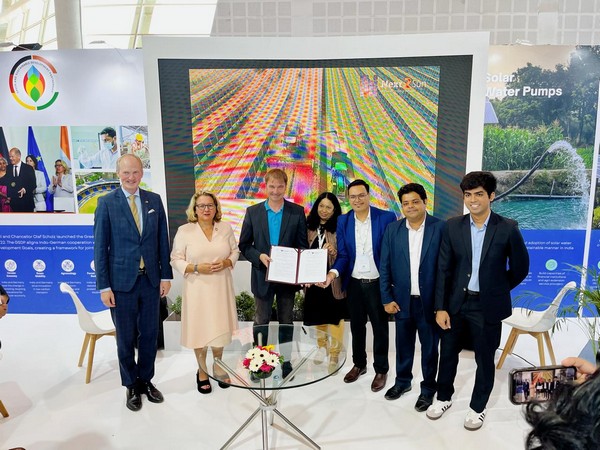MoU for Vertical Solar Tech Paves Way for Dual-Use Agriculture in India
Yashika Energy Systems, Next2Sun Germany, and Wattkraft India signed an MoU during RE-INVEST 2024. The partnership introduces vertical solar technology in India, combining renewable energy and agriculture on the same land. Pilot projects will be launched to demonstrate the innovative approach for nationwide adoption.

- Country:
- India
In a significant move for India's renewable energy landscape, Yashika Energy Systems, Next2Sun Germany, and Wattkraft India have signed a Memorandum of Understanding (MoU) during the RE-INVEST 2024. This partnership aims at revolutionizing renewable energy and agriculture through innovative vertical solar technology.
The newly introduced vertical solar technology will facilitate the generation of clean energy while allowing farmers to continue agricultural activities on the same land. This dual-use approach holds the potential to transform India's agrarian economy, helping in the nation's quest for energy independence and climate action.
Yashika Energy Systems' Yash Kishorkumar Gupta stated, "This partnership addresses land usage concerns in conventional solar installations which displace valuable agricultural land. The deployment of Next2Sun's vertical bifacial Agri-PV systems enables dual land use, combining crop cultivation and renewable energy generation." Gupta also revealed plans for pilot projects across India, aided by governmental and agricultural community support in both India and Germany.
This project comes at a critical juncture as India seeks sustainable solutions to meet its growing energy demands without hampering agricultural productivity. Vertical bifacial solar panels, generating energy from both sides, will be installed in a way that allows crop cultivation beneath them. Pilot projects between 100 kWp and 500 kWp are expected to showcase the technology's efficacy in various Indian regions.
The MoU signing was attended by key dignitaries including Sascha Krause-Tunker of Next2Sun AG, German Federal Minister Svenja Schulze, and India's Minister of New and Renewable Energy, Pralhad Joshi. Krause-Tunker emphasized the groundbreaking nature of the initiative, predicting it would set a new benchmark for sustainable development and inspire similar projects globally.
This initiative aligns with India's ambitious goals set at COP26, including achieving 500 GW of non-fossil electricity capacity and net-zero emissions by 2070. As India heavily relies on fossil fuels, integrating renewable sources becomes crucial to meet these climate goals.
(With inputs from agencies.)
ALSO READ
India-US Defense Ties: A Bipartisan Beacon
India's Economic Boom: Unveiling the $55 Trillion Vision
Rohit Sharma Returns to Lead India in Crucial Adelaide Test
India's Water Revolution: Groundbreaking Rainwater Harvesting Initiative Launched
SMFG India Credit Receives Impressive AA- Rating, Boosting Financial Inclusion Drive










